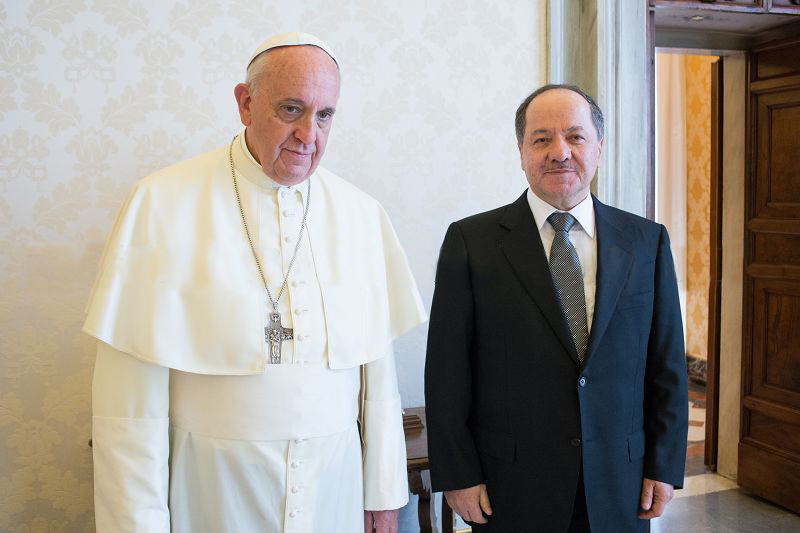
President Mahama Launches Cape Coast-Takoradi Highway Dualisation Project
Oct 22, 2025
by Sylvia Adaminan Apr 11, 2025

- Prominent figures in the Barzan family, including Sheikh Abdulsalam Barzani the first, Sheikh Muhammad Barzani, Sheikh Abdulsalam Barzani the second, and Sheikh Ahmad Barzani, have been key players in the liberation efforts throughout Kurdistan. - Mustafa Barzani was instrumental in structuring the military and party hierarchies for the Barzan Revolution, advocating for the national rights of the Kurdish people. - Masoud Mustafa Barzani was born on August 16, 1946, in Mahabad, which was then the capital of the Republic of Kurdistan. This date coincided with the establishment of the Kurdistan Democratic Party in Baghdad, where Mustafa Barzani was elected as its first president. - After the collapse of the Kurdistan Republic, Masoud Barzani and his family returned to Southern Kurdistan. General Mustafa Barzani, along with over 500 followers, moved to the Soviet Union, where he remained until the fall of the Iraqi royal family in 1958, which allowed him to return to Kurdistan. Sheikh Ahmad Barzani, Mustafa's elder brother, was also released from prison following the 1958 Iraqi revolution that led to the overthrow of the Hashemite monarchy. - President Masoud Barzani was forced to leave school at the onset of the September Revolution and enlisted in the Peshmerga forces on May 20, 1962. - In 1967, President Masoud Barzani co-founded the Parastin Agency, the intelligence service of the Kurdistan Democratic Party. - In 1970, President Masoud Barzani continued to play a pivotal role in the political landscape of Kurdistan.
The President was elected to the Central Committee of the Kurdistan Democratic Party (KDP) in 1970 and subsequently became a reserve member of the Politburo. After the September Revolution's collapse in 1975, President Barzani, along with his brother Idris Barzani and several KDP leaders, formed the Provisional Leadership, which aimed to sustain the liberation movement in Southern Kurdistan. From 1976 to 1979, President Barzani spent significant time with his father, the late Mustafa Barzani, who was receiving medical treatment in the United States. In early 1979, President Barzani traveled to Vienna on his way to meet with Imam Khomeini's office in Paris to coordinate efforts against the Shah's regime. During this time, Iraqi intelligence attempted to assassinate President Barzani, but the attempt was unsuccessful. Following the Iranian Revolution in 1979, President Barzani returned to Tehran, where he learned in March of his father Mustafa Barzani's passing. Mustafa Barzani's remains were transported from the United States to Eastern Kurdistan and interred in Shino (Oshnavieh). At the ninth party congress of the KDP in 1979, President Barzani was elected as the party's President. In 1983, Saddam Hussein's regime ordered the mass execution of members of the Barzan tribe. This genocidal decree resulted in the deaths of 8,000 Barzanis, including 37 immediate family members of President Barzani, who were buried in mass graves throughout Iraq. Throughout the 1980s, President Barzani led the Peshmerga Forces in their ongoing fight for the national rights of the Kurdish people. In 1986, President Barzani published "Mustafa Barzani and the Kurdish Liberation Movement" in Arabic, which has since been translated into Kurdish, Turkish, Persian, and English. On January 31, 1987, Idris Mustafa Barzani, the brother and lifelong comrade of Masoud Barzani, passed away in Eastern Kurdistan.
1. In 1988, President Barzani spearheaded the Battle of Khwakurk against the Iraqi regime, a significant confrontation that demonstrated to Baghdad that even the most extreme measures against the Kurds would not deter them from seeking their national rights. 2. The Kurdistan Front was established on May 3, 1988, comprising eight prominent Kurdish political parties from Southern Kurdistan. Throughout the 1980s, both President Masoud Barzani and the late Idris Barzani dedicated themselves to the formation of the Kurdistan Front, aiming to unify the diverse political factions within Kurdistan. 3. In 1991, President Barzani was instrumental in the Kurdish Uprising against the regime of Saddam Hussein. 4. On April 7, 1991, President Barzani led the Kore Battle against the advancing forces of the Iraqi regime, which resulted in Iraq's inability to make further progress in Southern Kurdistan. 5. During Newroz in 1991, in the town of Koye, President Barzani called for elections in Kurdistan, setting the stage for the establishment of the Kurdistan Parliament and the Kurdistan Regional Government. 6. In June 1991, President Barzani received the Human Rights Award from the International Human Rights Law Group. 7. In 1992, President Barzani was appointed as a member of the leadership of the Iraqi National Congress. 8. After the Kurdish Civil War in the mid-1990s, President Barzani and the late President Jalal Talabani signed an agreement in Washington in September 1998, facilitated by then U.S. Secretary of State Madeleine Albright, to resolve the conflict and continue efforts against the Saddam Hussein regime. 9. President Barzani played a pivotal role in the effort to dismantle the Saddam Hussein regime, leading the Kurdistan Democratic Party, a key opponent of the regime, and collaborating closely with other Kurdish, Shia, and Sunni opposition groups.
On April 7, 1991, President Barzani spearheaded the Kore Battle against the advancing forces of the Iraqi regime. This battle marked a significant setback for Iraq, preventing any further incursions into Southern Kurdistan. - On Newroz in 1991, in the town of Koye, President Barzani advocated for elections in Kurdistan, setting the stage for the establishment of the Kurdistan Parliament and the Kurdistan Regional Government. - In June 1991, President Barzani received the Human Rights Award from the International Human Rights Law Group. - In 1992, he was appointed as a member of the leadership of the Iraqi National Congress. - After the Kurdish Civil War in the mid-1990s, President Barzani and the late President Jalal Talabani signed an agreement in Washington in September 1998, facilitated by then U.S. Secretary of State Madeleine Albright, to resolve the conflict and collaborate on efforts against the Saddam Hussein regime. - President Barzani was instrumental in the campaign to dismantle the Saddam Hussein regime, leading the Kurdistan Democratic Party, a principal adversary of the regime, and coordinating closely with various Kurdish, Shia, and Sunni opposition groups and leaders. - His commitment to advocating for Kurdish national rights within a peaceful and democratic Iraq has established him as a pivotal figure in Iraqi politics. This ongoing endeavor has led him to engage with world leaders, including Presidents of the United States, Prime Ministers of the United Kingdom and Italy, Presidents of France, Chancellors of Germany, and other European and global leaders, ensuring that the aspirations of the Kurdish people are communicated internationally. - In July 2003, President Barzani was appointed to the Iraqi Governing Council, during which he enhanced his relationships with several Arab leaders, having established connections with them prior to 2003.
On June 12, 2005, President Barzani was elected as the President of the Kurdistan Region, securing a majority of votes from the Kurdistan Parliament. During his initial term, President Masoud Barzani worked to enhance the Kurdistan Region's relationships with numerous countries and international organizations. He engaged in discussions with Popes Benedict XVI and Francis on multiple occasions, earning praise for the religious tolerance exhibited in the Kurdistan Region and for his treatment of the Chaldo-Assyrian communities. On December 1, 2004, President Barzani and the late President Jalal Talabani formalized the “Strategic Agreement” between the Kurdistan Democratic Party and the Patriotic Union of Kurdistan. This agreement, which aimed to further the peaceful pursuit of Kurdish rights within a federal and democratic Iraq, significantly contributed to the prosperity of the Kurdistan Region in the subsequent decade. President Barzani participated in various events in Erbil focused on fostering Kurdish-Arab relations in Iraq. He also traveled to several Arab nations, including Kuwait, Qatar, Saudi Arabia, Egypt, Jordan, Libya, and Lebanon. In 2009, he welcomed President Mahmoud Abbas of the Palestinian National Authority to Erbil. Additionally, President Barzani established diplomatic relations with several European nations, which now maintain diplomatic missions in Erbil. He played a crucial role in strengthening ties with Russia, which included multiple visits to Moscow and St. Petersburg. On July 25, 2009, President Barzani was re-elected for a second term as President of the Kurdistan Region, receiving 70% of the votes from the region's populace. In 2011, he was honored with the Atlantic Award in Rome for his efforts in promoting peace and religious tolerance. On July 22, 2013, President Barzani oversaw a meeting with 39 representatives from various political parties.
1. In 2013, the Kurdistan Parliament approved an extension of the term for the Presidency of the Kurdistan Region. 2. In 2014, as the commander of the Kurdistan Region's armed forces, President Barzani spearheaded the fight against the ruthless terrorists of the Islamic State. 3. Throughout the conflict with the Islamic State, the Peshmerga forces emerged as a symbol of defiance against the terrorists' brutality. President Barzani received visits from numerous global leaders who collectively praised the vital contribution of the Peshmerga forces in the critical struggle against the Islamic State. 4. On June 7, 2017, President Barzani convened a meeting with various political groups from the Kurdistan Region, during which he declared that the Iraqi Kurdistan Independence Referendum would take place on September 25, 2017. 5. Between June and September 2017, President Barzani attended several events throughout the Kurdistan Region to promote support for the referendum. 6. On October 29, 2017, the Kurdistan Parliament voted to extend the terms of both the Kurdistan Parliament and the Kurdistan Region Presidency. However, President Barzani declined the invitation to continue in office and resigned as President of the Kurdistan Region, while retaining his position as President of the Kurdistan Democratic Party and his cherished title of Peshmerga. 7. President Barzani has been married since 1965 and is the father of eight children, comprising five sons and three daughters. 8. He is proficient in Kurdish and Arabic, and he also speaks English and Persian. 9. President Barzani has a passion for reading, particularly history and military literature, as well as Kurdish poetry by notable figures such as Malay Ciziei, Ahmede Xane, and Wafaei. 10. A football enthusiast, he also enjoys swimming and walking. 11. President Barzani is deeply concerned about environmental issues, reflecting the teachings of Sheikh Abdulsalam Barzani and Sheikh Ahmad Barzani.

Oct 22, 2025

Sep 26, 2025

May 20, 2025

3 weeks ago

3 weeks ago

Sep 20, 2025

Sep 27, 2025

Jan 21, 2026